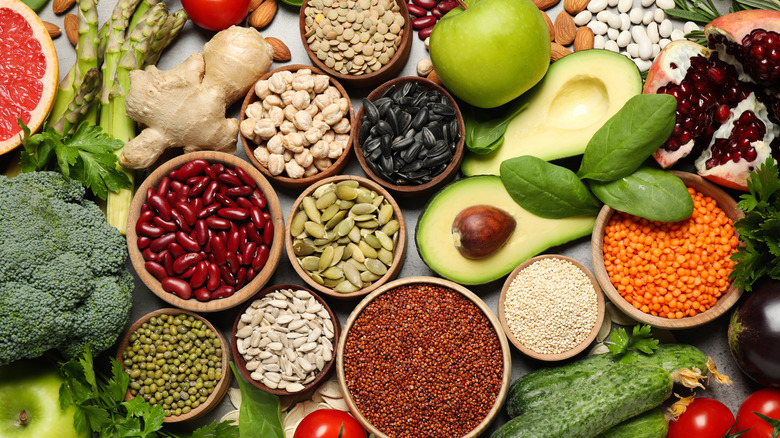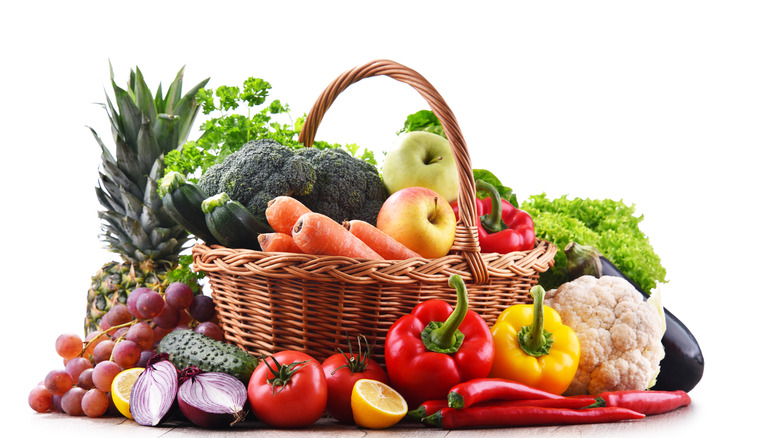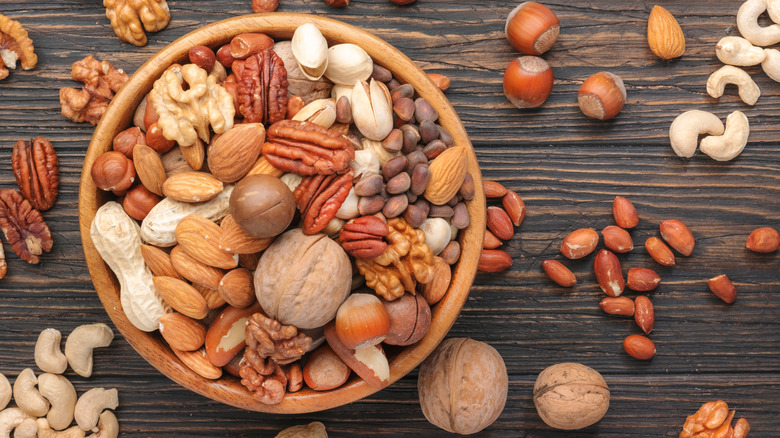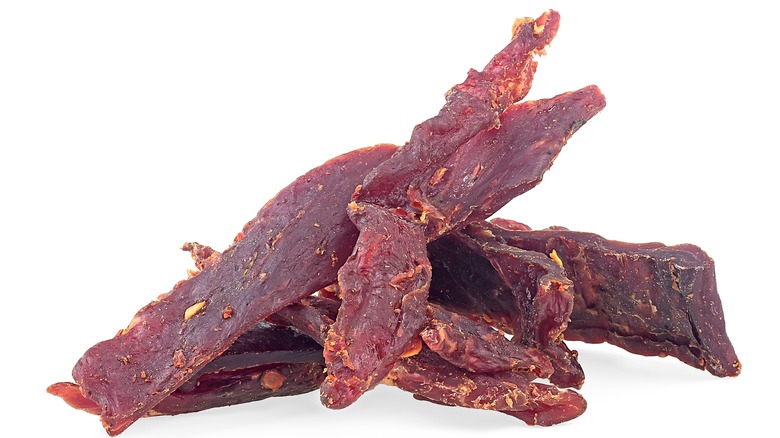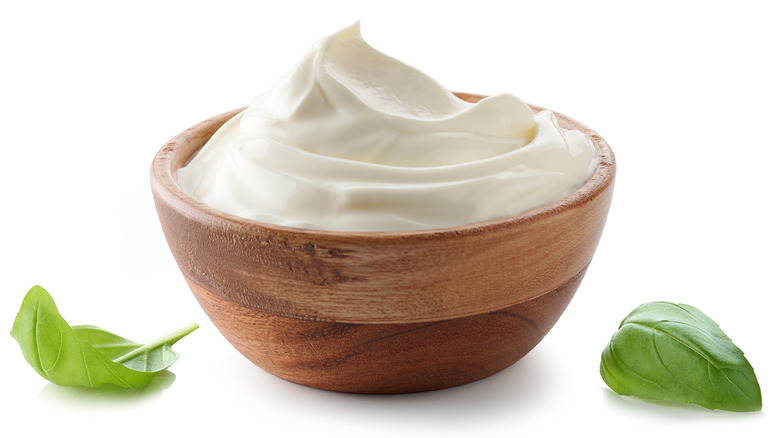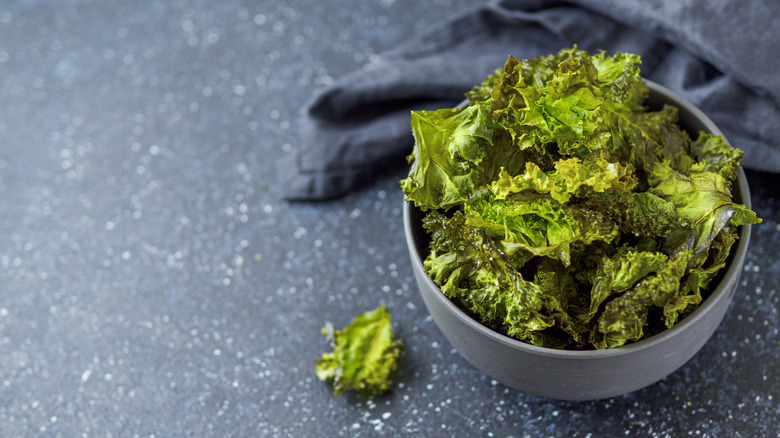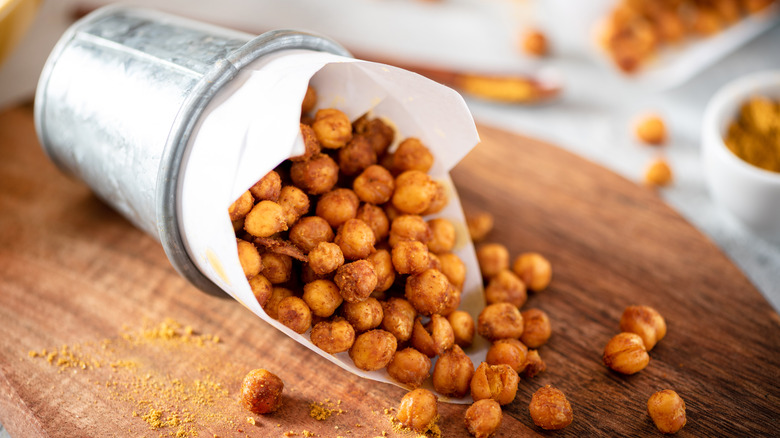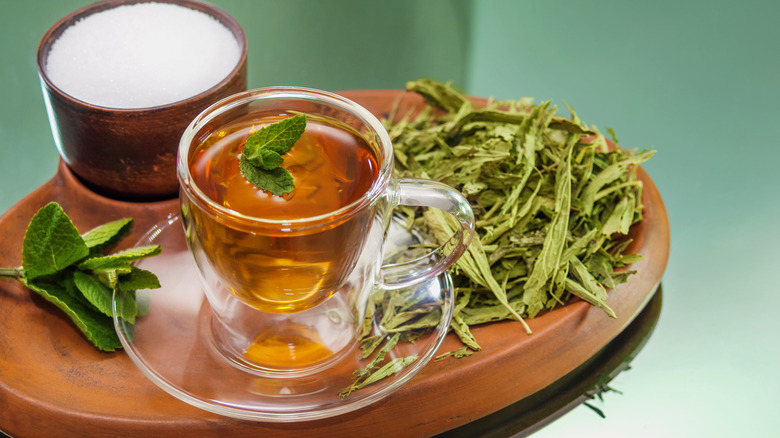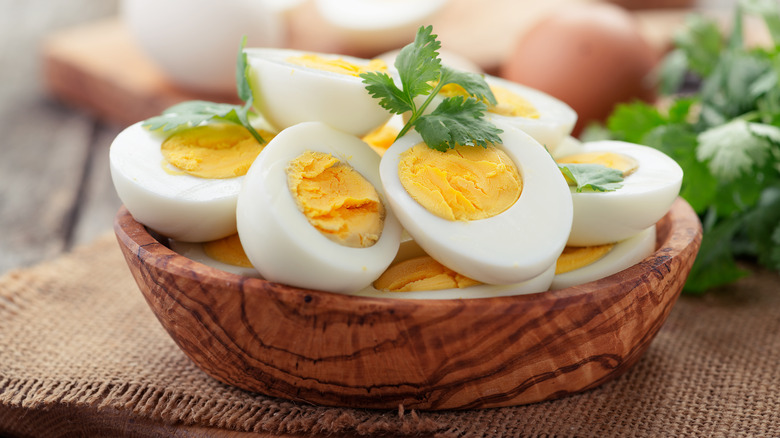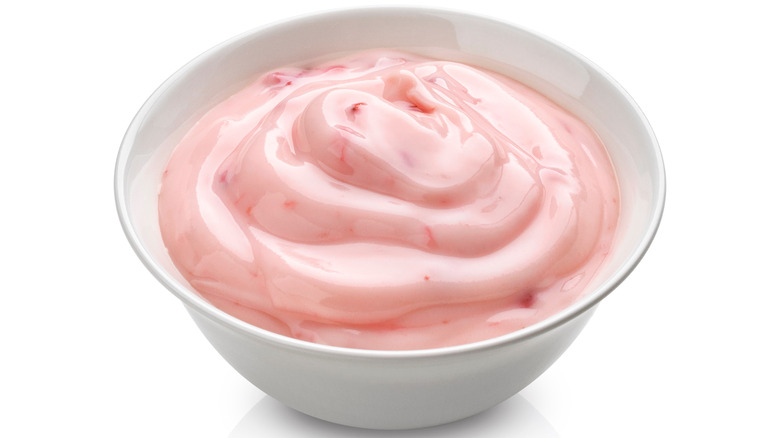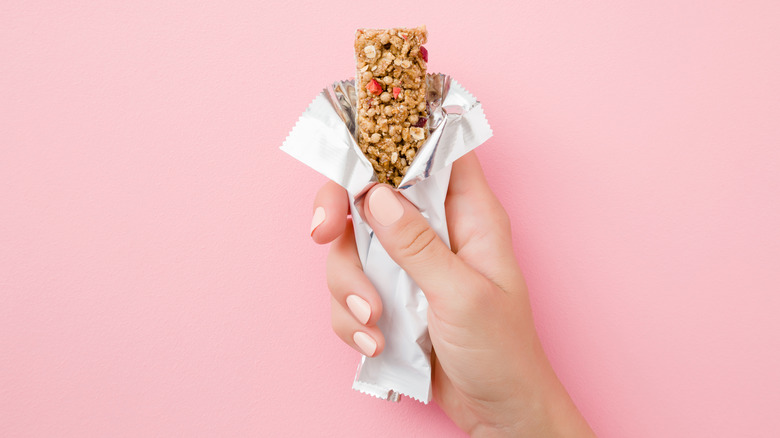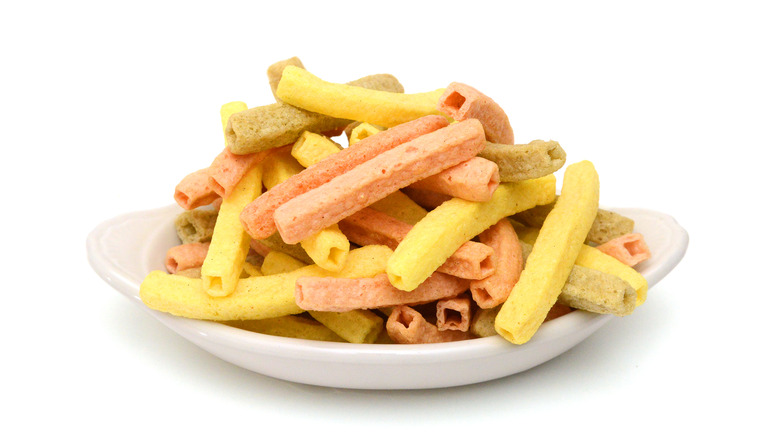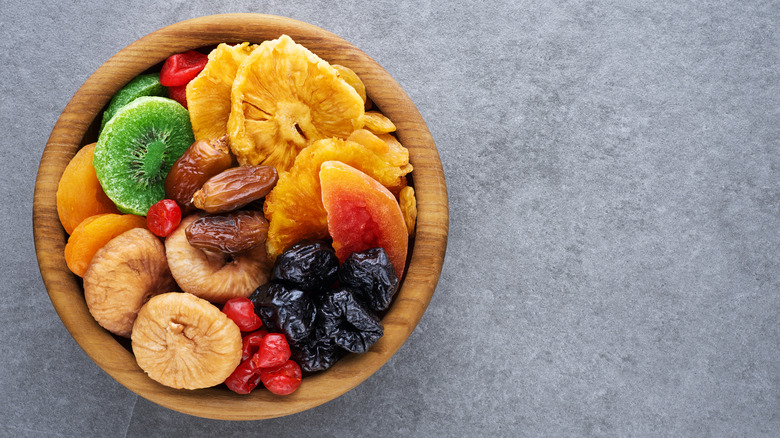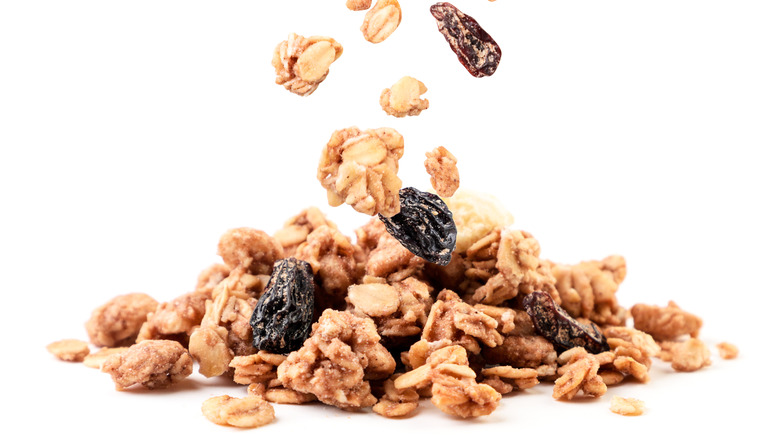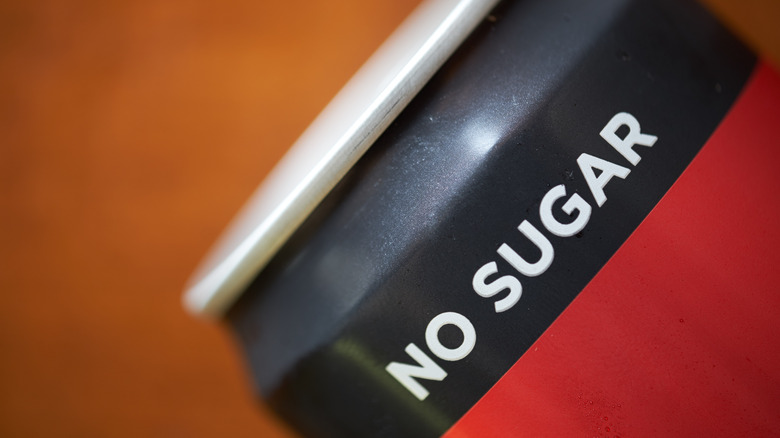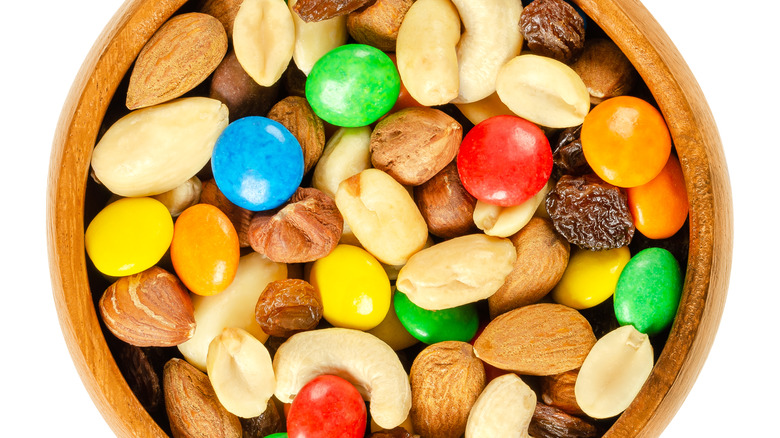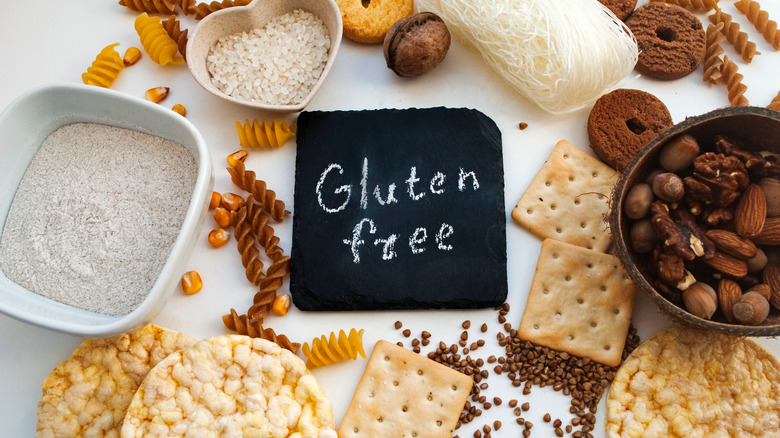'Healthy' Snacks You Should And Shouldn't Buy
In the world of health and fitness, outdated advice or misconceptions can get it the way of trying to eat better. Studies and claims can contradict each other, and ads for health foods are not always truthful. In fact, brands have been found guilty of making false claims relative to the healthfulness of their products, as reported by Econsultancy. And when it comes to snacks, things can get even more dicey, as many common snacks are prepackaged and store-bought, with long lists of ingredients we might not always look at closely.
It's easy to feel overwhelmed when you're browsing a grocery store aisle full of different bars, or an entire stretch of yogurts ranging from dairy free to flavored, or those made from different types of milks. But in a world where variety is plentiful and new products come out all the time, there are ways to select between the "healthy" snacks you should avoid, and the ones you might overlook that are actually powerhouses that can benefit your diet.
Do eat: Fresh fruits and vegetables
It's common knowledge that eating fruits and vegetables is generally a healthy thing to do. In the United Kingdom, the 5 A Day campaign comes from the World Health Organization's statement that fruits and vegetables can lower the risk of contracting serious diseases, including some types of cancer. And the Harvard T.H. Chan School of Public Health agrees, stating that fruits and veggies can help lower blood pressure, prevent cancer, reduce incidences of digestive problems, and regulate blood sugar.
Snacking on fruits and vegetables is easy, as many types don't require refrigeration. Keep bananas, apples, or mandarins by your desk, or pack in-season berries when you're out and about. When you're at home, or if you have access to a fridge at work, good options include strawberries, grapes, and various types of melons. As for vegetables, baby cucumbers are easy to snack on, as are carrot sticks, cherry tomatoes, or celery. You can also create endless variations by mixing and matching your favorites into exciting salads.
Do eat: Nuts
Nuts sometimes get a bad rap for being high in fats, but as WebMD explains, nuts are nutritionally rich, with an abundance of vitamins and minerals. Some of them are also high in omega-3 fatty acids, which incredibly enough, can help reduce rheumatoid arthritis, and protect against dementia.
Need more convincing? The Mayo Clinic stated that eating more nuts could lower bad cholesterol, help keep arteries healthy, and reduce the risk of heart disease and blood clots. And that's not all! The American Heart Association recommends nuts for their taste and nutrition, whether eaten whole or as nut butters.
Carrying nuts in your bag or in your car can be useful when hunger strikes and you feel tempted to grab junk food on-the-go. Just don't forget to actually eat them, as they can go rancid. At home, keep nuts in the fridge or freezer, and as a portable snack, remember to replace them regularly.
Do eat: Quality jerky
Jerky isn't only practical, as it's highly shelf-stable, but it's also high in nutrients. HealthLine lists its nutritional content, which includes protein and a slew of vitamins and minerals. It's an impressive breakdown that's confirmed by a 2018 study published in the peer-reviewed journal Molecules, where study authors concluded beef, ostrich, and chicken jerky all could be good sources of nutrition.
Unfortunately, some jerkies can contain questionable ingredients and preservatives. Look for brands with short ingredient lists and no added sugar or nitrites. Look for the labels "grass-fed," "paleo," or "organic" as a good starting point. Eat This Not That recommends brands such as Epic, The New Primal, and Lorissa's Kitchen.
And don't shy away from some of the fun flavors or different varieties of dried meats on the market. With options like chicken sriracha, cranberry bison, and meats like venison, turkey, or salmon, you're sure to find something you'll like. Try keeping sealed jerky in your gym bag or take some hiking, and look for variety packs so you always have something that fits your food cravings.
Do eat: Plain Greek yogurt
Greek yogurt is easy to find practically anywhere — even in gas stations — and it packs a powerful nutritional punch. According to Medical New Today, it may help improve mental health, as well as help lower the risk of diabetes, and blood pressure. Registered dietitian nutritionist Elena Paravantes shared with Eat This, Not That! that "good things happen when you consume Greek yogurt every day" as it is a longevity-promoting food fundamental to the Mediterranean diet.
Greek yogurt requires refrigeration, which makes it a snack better suited for the house or the office. But if you're feeling like having an evening snack, or your workout has you craving protein, it's a great choice. If plain yogurt is a little too hard to enjoy, a handful of fresh berries goes great with a bowl of creamy Greek yogurt, or you can add a little sprinkle of monk fruit sweetener. A 2020 study published in the Journal of Dairy Science found that monk fruit used to sweeten yogurt rich in prebiotics and probiotics helped delay the progression of type II diabetes ... but as promising as this sounds, just keep in mind that the study was performed in rats, so more research is needed before a direct correlation to humans can be drawn.
Do eat: Kale chips
The crunch and flavor of potato chips is appealing to many, but you don't need to eat deep-fried potatoes loaded with refined oils and high amounts of sodium to get a similar experience. Enter: kale chips. Usually made of kale, a small amount of high-quality oil (or no oil), and some seasonings, kale chips can satisfy your snack cravings easily. Linda Shiue, MD, a doctor writing for Kaiser Permanente, encourages the consumption of kale because its nutritional value remains relatively stable after baking, retaining most of the fiber, vitamins, and minerals in the snack. Livestrong confirms that statement, adding that the final product still provides a texture similar to regular potato chips.
Kale chips can be found at most well-stocked grocery stores in many flavors ranging from plain to zesty nacho, but you can also make them yourself. Simply coat torn kale leaves with a fine drizzle of olive oil and sea salt, and bake at a low temperature until crunchy. Or, try experimenting with different flavors, like smoked salts, curry powders, or even a little chili powder.
Do eat: Roasted chickpeas or edamame
Chickpeas are not only a beloved legume of the Mediterranean diet, but according to longevity expert Dan Buettner, who is credited with discovering the Blue Zones, they are one of the most recommended foods of nutritionists and food scientists (via CNBC Make It). Roasted chickpeas are becoming more and more mainstream, and are often found in grocery stores. But, you can also make them at home by tossing canned and well-dried chickpeas with a little olive oil and a sprinkling of salt. Just cook them at 400 F until crispy, and they're ready to enjoy.
Science agrees with chickpeas' health benefits, as a 2016 study published in the Journal of the Science of Food and Agriculture found that roasted chickpeas maintain their nutritional content and suitable for low-glycemic diets.
Another good option is edamame, roasted or not. WebMD calls it "a star legume" with an abundance of fiber, protein, vitamins, and minerals. Try grabbing steamed or roasted edamame when you're looking for a savory snack that will keep you full for quite a while.
Do eat: Stevia-sweetened drinks
Sugar isn't just present in obvious foods like cakes, cookies, and candies. You can also find large quantities of it in many store-bought drinks. In fact, a 2017 study from the peer-reviewed journal QJM showed a strong link between sweetened sodas and obesity, and the association extended to artificially sweetened drinks as well.
Thankfully, we have healthier alternatives that aren't just plain water. Medical News Today reports that stevia is a great alternative to table sugar, and just like artificial sweeteners, contains close to no calories. It also tastes sweeter than sugar, and has become more mainstream over the years, to the point that many grocery stores now carry stevia-sweetened sodas that taste just like the other sodas. They go on to state that the possible benefits of stevia include a lower risk of diabetes and some cancers, better blood pressure, easier weight control, and fewer allergies.
Do eat: Hard-boiled eggs
Eggs are a nutritious food that's also very inexpensive, with a dozen eggs averaging less than $2 in 2021. Even organic, free-range eggs, which can reach $6 a dozen, still make a single egg cost an average of 50 cents. Registered dietitians shared in Time Magazine that when considering the protein and nutrient content, eggs make a great snack. Registered dietitian Brigitte Zeitlin even shared that they contain what we need to maintain strong and healthy muscles.
With more than 6 grams of protein per large egg according to the USDA, and only about 70 calories, eggs can help curb your mid-afternoon snack craving without the guilt. And beyond that, The American Journal of Medicine published a 2020 study which suggested that eating more than one egg a day did not raise the risk of cardiovascular disease, but might actually reduce the risk of coronary artery disease.
Do not eat: Flavored and frozen yogurts
When you think about yogurt advertisements, you may conjure up images of probiotics and healthy digestion, or protein and strong muscles. And while this can be true of some brands, it's not necessarily the case with flavored yogurt, which according to the Cleveland Clinic, can contain more sugar in a single serving than the daily recommended amount of daily sugar intake for women (25 grams) and men (36 grams). And sugar-free options are no better, as the Cleveland Clinic states that they can lead to sugar cravings later in the day.
And frozen yogurt is in the same boat, as Women's Health reports that both "froyo" and ice cream contain about the same amount of sugar, and that's before adding any toppings
If you enjoy yogurt as a snack, make sure to stock your fridge with sugar free, high-protein options like Icelandic or Greek yogurt. You can always jazz them up with a pinch of dark chocolate chips, a handful of fresh berries, or some diced bananas.
Do not eat: Energy bars
Energy bars may be a convenient snack, but unless the brand you're eating makes a point to provide a healthy dose of protein without much added fat or sugar, then according to CNN, they may be closer to a candy bar than a healthy snack. CNN reports that some bars can contain as much sugar and fat as a Snickers bar, and Health Matters agrees. They explain that while energy or protein bars seem healthy at first glance, and can be marketed as such, they're often too high in calories — upward of 350 calories each.
If you find snack bars handy in a pinch, look for those that advertise a high protein content, and keep an eye on the caloric load. Or, carry a small snack bag of roasted nuts, or some fruit like apples and bananas with you. For a punch of protein, high-quality jerky without added sugar is also a good alternative to an extra sweet energy bar.
Do not eat: Veggie Chips and Sticks
Veggies are healthy, right? Yes, if we're referring to actual, fresh vegetables like cucumbers, fennel, or green beans. But in a Cleveland Clinic article on the worst snacks dietitians recommend never to eat, veggie chips and veggie sticks make the list, citing the fact that they have almost no fiber and protein, and close to no nutrients.
Instead of veggie sticks and chips, the dietitians recommend eating real veggies ... which makes sense. Try dipping tomatoes in Greek yogurt with a small sprinkle of sea salt or a few chopped mint leaves. Or enjoy fresh cucumbers enlivened with a squeeze of lemon juice, or dipped in hummus. Sweet carrots cut into crinkle chips can make a fun snack, and you can add variety by selecting heirloom varieties which come in white, purple, and yellow colors. Eating peas out of the pod can also make a fine substitute to fat- and salt-heavy snacks.
Do not eat: Dried fruits
Fruits are a healthy snack ... as long as they're fresh and not dried. This may seem contradictory — aren't dried fruits basically just fresh fruits without the water? Yes, they are, but because they're so small, and the sweetness is more concentrated, it can be easy to overeat them. According to Harvard Health, eating 30 grapes takes a lot more time than eating 30 raisins, which can be gobbled up in a few bites. Plus, some dried fruits contain added sugar. Consumer Reports agrees that calories can add up pretty quickly!
But more potentially concerning are the sulfites sometimes added to dried fruit. According to Organic Authority, the World Health Organization and the International Program on Chemical Safety found that sulfites may be hazardous to people with asthma, and a study published in the journal Mutagenesis found that sulfur dioxide might cause cancer in mice.
Instead of dried fruits, prioritize the fresh counterparts. If you really enjoy dried fruits and want to keep them as part of an otherwise healthy and balanced diet, make sure to select brands with no sulfites and no added sugars, and limit yourself to a reasonable portion size.
Do not eat: Granola
Few things are more convenient than pouring some granola on top of yogurt, or grabbing a handful of it on the way out the door. But Eat This, Not That! says it comes at a cost with a typically-high sugar content akin to eating small packages of candy. Well + Good goes on to say that granola can also be high in calories and unnecessary refined oils.
Granola is marketed as healthy because it often contains some healthy ingredients and corresponding benefits. For instance, Well + Good points out that it's often high in fiber and iron. It also usually contains nuts, which are healthy, but often in small amounts that don't make a significant contribution to your daily macronutrients.
Instead of chowing down on granola, opt for whole nuts, and reach for pumpkin and sunflower seeds to add to your yogurts and trail mixes. A bowl of plain oatmeal topped with a few shavings of dark chocolate, some roasted and chopped nuts, and some fresh raspberries can make for a much more satisfying breakfast or snack, without the oils and calories that accompany most granolas.
Do not eat: Artificially-sweetened drinks
We generally know that too much sugar is not healthy, but what about sugar substitutes? Unfortunately, a 2006 study published in Environmental Health Perspectives found that aspartame might cause cancer in rats. A 2009 study from Diabetes Care found a link between diet soda intake and an increased risk of diabetes, and a 2018 study published in the journal Inflammatory Bowel Disease found a link between Splenda and Crohn's disease.
Instead of sweetened drinks (real or artificially-sweetened) for your mid-afternoon hydration, try to plan ahead and make your own spa water by soaking thin slices of lemons or limes in water in the fridge. You can even make it sweet by using thin orange or pineapple slices. You can make it more decadent with a little stevia extract (considered a good sugar substitute) or monk fruit powder ... or simply reach for store-bought sodas made with natural sweeteners like Zevia's stevia-sweetened, zero-calories sodas, or Humm's Zero Kombucha.
Do not eat: Trail Mix
Trail mix conjures images of hiking and whole, roasted nuts, but the truth is that most trail mixes are far from healthy. According to Healthline, store-bought trail mix can be high in sugar, sodium, calories, and it can be easy to overeat.
Eat This, Not That! rounded up some of the best and worst trail mixes out there, and found the main offenders to be loaded with candy, chocolate, marshmallows, hydrogenated oils, sweetened dried fruits, and other junk foods. If you still want to eat store-bought trail mix, remember that it's more of a treat than a healthy snack, which means you need to stick to strict portion sizes according to Consumer Reports.
Or, why not make your own? Toast some nuts and seeds (walnuts, pecans, almonds, pumpkin seeds, and sunflower seeds are good choices), and stir them into a small amount of unsweetened, low-glycemic dried fruit such as goji berries or golden berries, then add a few dark chocolate chips. Remember that even homemade, trail mix is still very much a treat, and not a snack you should have on a regular basis ... especially if you aren't exercising regularly.
Do not eat: Gluten-free crackers
When the gluten-free lifestyle became more mainstream, grocery stores started stocking gluten-free equivalents of wheat-containing foods like pastas, crackers, cookies, and breads. While definitely better for individuals with celiac disease and people with gluten sensitivities, gluten-free snacks may not actually be recommended for those who are able to digest wheat and gluten-containing products. In fact, the American Academy of Pediatrics found that the majority of gluten-free products targeted toward children had less protein than the regular equivalents, and many of them had high sugar levels.
And, the Mayo Clinic confirms the lower protein content of commercial gluten-free products, and adds that they can also be lower in many of the minerals that are usually added to flour to make it more nutritious.
If you're not able to digest gluten, gluten-free options are an obvious choice, but fresh, unrefined ingredients are always a better choice than boxed, store-bought products. Instead of dipping crackers and chips into hummus, try eating cucumbers and carrots with your dip. Instead of spreading peanut butter on bread, try spreading it on apple slices. The choices are endless once you start prioritizing fruits and vegetables.
